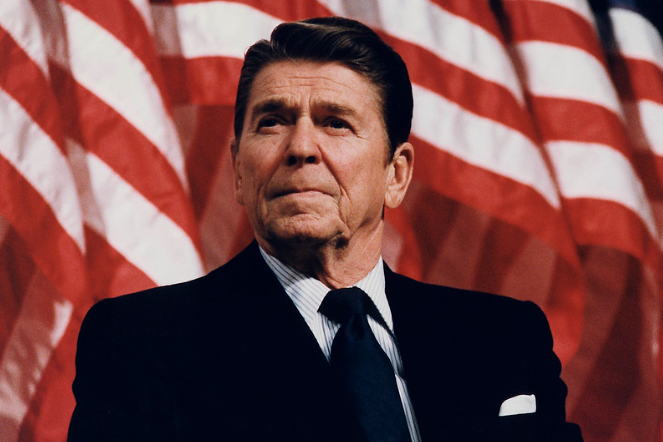In case you hadn’t noticed, a former show-biz star, notable divorcé, assassination attempt target, and political outsider-turned President of the United States has occupied the news recently.
I am, of course, talking about Ronald Reagan, but the parallels to the current Republican nominee for the White House are increasingly uncanny. However, the historical rhymes among these two are not the only insight we can gain from the fabulous, recently released picture, “Reagan.”
In case you have not seen it yet – and you should – the movie’s through-line is the story of Reagan as the “Crusader,” the man who took down the Soviet Union and won the Cold War. The USSR is no more, but today’s world lies in murky waters as Russian leader Vladimir Putin attempts to, at least partially, regain territory that was once behind the “Iron Curtain.”
Republicans have long been weary of contemporary Russian threats on the world stage, a trend that prompted President Obama to tell his Republican opponent Mitt Romney in a 2012 Presidential Debate, “The 1980s are now calling to ask for their foreign policy back, because the Cold War’s been over for 20 years.” Well, Mr. President, if recent events have told us anything, it’s that Russian goals are reminiscent of their 20th-century forefathers. Neville Chamberlain called; I think he wants his foreign policy back.
No, the Cold War is not still active with Russia, though China may have taken the USSR’s mantle in that regard. Yet, the Reagan movie displays a foreign policy strategy that won us that conflict, one prudent to hold today. Phrases like “peace through strength,” “clarity is power,” and “say what you mean, mean what you say” are riddled throughout the film and also in the Trumpian diplomacy that kept us out of war until President Biden’s coronation.
Additionally, the domestic political environment in which Reagan rose to prominence is eerily similar to that of September 2024. In a conversation among other political figures about his switching parties, Reagan remarked, “I didn’t leave the Democratic Party, it left me.” It is redundant to point out figures like Elon Musk, Robert F. Kennedy Jr., Tulsi Gabbard, and countless others who seem to plagiarize those exact words are confronted with the same evermore radicalized party that Reagan saw then.
In the 1980 race against President Carter, infamous for his “malaise” speech, Reagan asked Americans, with inflation and geopolitical uncertainty in mind, “Are you better off than you were four years ago?” Again, the similarities go without saying.
I point out these comparable circumstances for a reason — Reagan not only showed us that we can overcome these problems, but also how to do so.
Just as Reagan’s success was not purely a matter of legislation, elections or executive policy, overcoming today’s challenges cannot happen strictly in the political sphere. Reagan elegantly stated that difficult times remind us that “we are spirits, not animals.” Reagan had a deep, abiding faith in God planted in him by his mother, and that was the nucleus of everything we know him for today. From a feeling that fighting communism was “a gift from God” to a prophecy that he would become president if he “continued to walk uprightly” before the Lord, God’s hand guided the man through everything. His words seem timeless because they literally are – they are eternal.
On a similar note, upon meeting and sparking a romance with Nancy Davis, Reagan divulged that he was “damaged goods,” but that he just wanted “to do something in this world, to make a difference.” Nancy countered, “It’s really hard to make a difference alone.” In an America where marriage rates are sliding, divorce rates are climbing, and the biblical nuclear family is under siege, we should remember that we cannot make a difference in a vacuum and that real change starts with those in our immediate circle.
Reagan also gave us an excellent example on how to behave personally, especially in the political realm. Ever willing to crack a gracious joke, self-deprecating or otherwise, Reagan reminds me of G. K. Chesterton’s quote, “Angels can fly because they can take themselves lightly.” This attitude also led Reagan to hold to certain guidelines like “every day has a 6 p.m.” with Democrat Speaker Tip O’Neill, after which they were close friends, not enemies. Reagan never lost sight of the existential, black-and-white battles he was fighting, but he understood the significance of not taking every little thing so seriously, giving himself invaluable perspective.
Watching the Reagan movie feels like you are watching the real man at times, not just actor Dennis Quaid. It strikes any watcher as if it might be occurring in real time in today’s world. What rings more true, however, are the elegant, gentlemanly ways Reagan carried himself and the seemingly prophetic guidance the film gives us.
Carter Ashcraft is a 21-year-old from Tuscaloosa, Ala., who is majoring in political science at the University of Alabama. You can contact him at carterashcraft12@gmail.com.
The views and opinions expressed here are those of the author and do not necessarily reflect the policy or position of 1819 News. To comment, please send an email with your name and contact information to Commentary@1819News.com.
Don't miss out! Subscribe to our newsletter and get our top stories every weekday morning.










